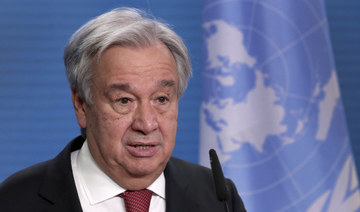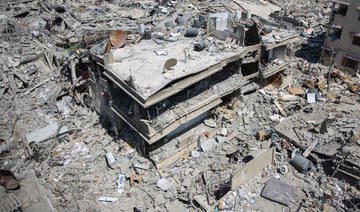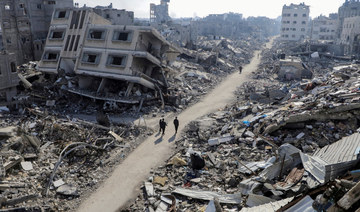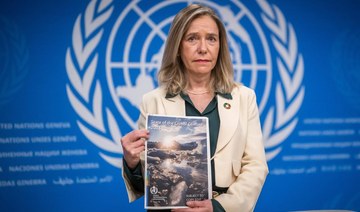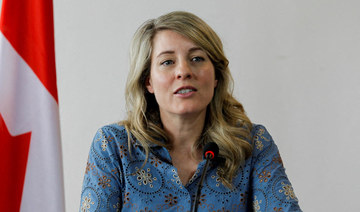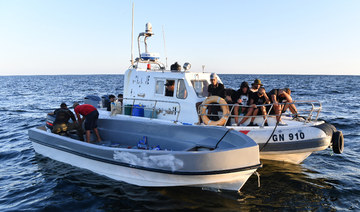UNITED NATIONS: As he starts his second term as UN secretary-general, Antonio Guterres said Thursday the world is worse in many ways than it was five years ago because of the COVID-19 pandemic, the climate crisis and geopolitical tensions that have sparked conflicts everywhere — but unlike US President Joe Biden he thinks Russia will not invade Ukraine.
Guterres said in an interview that the appeal for peace he issued on his first day in the UN’s top job on Jan. 1, 2017 and his priorities in his first term of trying to prevent conflicts and tackle global inequalities, the COVID-19 crisis and a warming planet haven’t changed.
“The secretary-general of the UN has no power,” Guterres said. “We can have influence. I can persuade. I can mediate, but I have no power.”
Before he became UN chief, Guterres said he envisioned the post as being “a convener, a mediator, a bridge-builder and an honest broker to help find solutions that benefit everyone involved.”
He said Thursday these are things “I need to do every day.”
As an example, the secretary-general said this week he spoke to the African Union’s envoy Olusegun Obasanjo, twice with Kenya’s President Uhuru Kenyatta, and once with Ethiopia’s Prime Minister Abiy Ahmed in his attempt to get a cessation of hostilities in Ethiopia between the government and forces in the embattled Tigray region.
“I hope that we are in a situation in which it might become soon possible to have a cessation of hostilities and that is where I’m concentrating most of my efforts,” Guterres said.
As another example, Guterres said he has also been on the phone to try to get Mali’s military leaders who recently delayed elections scheduled for next month to 2026 to reduce the timetable. He said he spoke to Mali’s military ruler, President Assimi Goita, three presidents from the 15-nation West African regional group ECOWAS, Algeria’s prime minister and the African Union’s leader about “how to make sure that in Mali, there is an acceptable calendar for the transition to a civilian government.”
Guterres said he hopes Mali’s military leaders will understand that they need to accept “a reasonable period” before elections. The secretary-general believes voting should be held in “a relatively short amount of time,” and said: “All my efforts have been in creating conditions for bridging this divide and for allowing ECOWAS and the government of Mali to come to a solution with an acceptable delay for the elections.”
Guterres said the UN Security Council, which does have the power to uphold international peace and security including by imposing sanctions and ordering military action, is divided, especially its five veto-wielding permanent members. Russia and China are often at odds with the US, Britain and France on key issues, including Thursday on new sanctions against North Korea.
On the issue on every country’s front burner now — whether Russia, which has massed 100,000 troops on Ukraine’s border, will invade the former Soviet republic — Guterres said, “I do not think Russia will invade Ukraine, and I hope that my belief is correct.”
What makes him think Moscow won’t invade when Biden and others believe Russian President Vladimir Putin will send troops into Ukraine?
“Because I do not believe in a military solution for the problems that exists, and I think that the most rational way to solve those problems is through diplomacy and through engagement in serious dialogue,” Guterres said, stressing that an invasion would have “terrible consequences.”
The secretary-general said “we have been in contact, of course” with top officials in Russia, though the UN is not directly engaged in the Ukraine crisis.
Guterres is scheduled to deliver a speech to the 193 UN member nations in the General Assembly on Friday on his priorities for 2022.
He singled out three immediate priorities that “are worrying me enormously”: the lack of vaccinations in large parts of the world, especially in Africa; the need to reduce emissions by 45 percent in this decade to try to meet the international goal of trying to limit future global warming to 1.5 degrees Celsius (2.7 degrees Fahrenheit); and the “extremely unjust” financial situation in the world that favors rich countries.
Many developing countries have very few resources, high debts that are growing and they pay much higher interest rates than in Europe or North America, have no vaccines, and disproportionately “suffer the impacts of climate change,” Guterres said.
“We need a deep reform in our international financial system in order to make sure that there is more justice in the way resources are available to allow for the recovery (from COVID-19) to be possible everywhere,” he said.
On another major issue, Guterres stressed that the Afghan people can’t be collectively punished for “wrong things that are done by the Taliban,” so it is absolutely essential to massively increase humanitarian aid “because the Afghans are in a desperate situation with the risks of deaths by hunger” and disease in a frigid winter with COVID-19.
“More than half the population is in desperate need of humanitarian aid,” he said, and money needs to be injected into the economy to ensure Afghan banks operate and doctors, teachers, engineers and other workers are paid to prevent the country’s economic collapse.
The issue of recognition of the Taliban government is up to member states, Guterres said, but the UN has been pressing the Taliban, which took power in August as US-led NATO forces were departing after 20 years, to ensure human rights, especially women’s rights to work and girls’ education, and to make the government more inclusive and reflective of Afghanistan’s diverse population.
The secretary-general said he will be attending the Beijing Olympics in February “which is not a political act” but “to be present when all the world comes together for good — for a peaceful message.”
UN chief: World worse now due to COVID-19, climate, conflict
https://arab.news/9pxuf
UN chief: World worse now due to COVID-19, climate, conflict
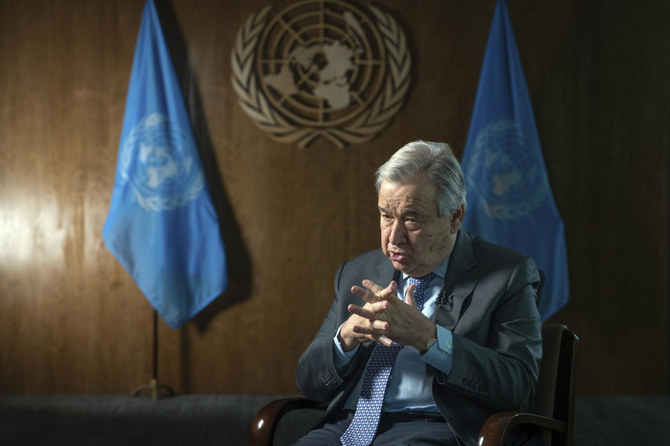
- ‘The secretary-general of the UN has no power. We can have influence. I can persuade. I can mediate, but I have no power’
Argentina seeks arrest of Iran minister, recently in Pakistan, over 1994 Jewish center bombing
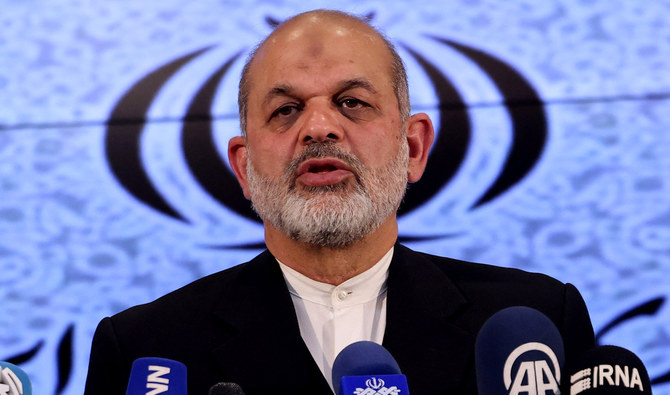
- Argentina contacted Interpol and asked Pakistani, Sri Lankan governments to arrest Iran’s interior minister
- The 1994 bombing has never been claimed or solved, but Argentina has suspected Iran to be behind the attack
BUENOS AIRES: Argentina has asked Interpol to arrest Iran’s interior minister over the 1994 bombing of a Jewish community center in Buenos Aires that killed 85 people, the foreign ministry said Tuesday.
That minister, Ahmad Vahidi, is part of an Iranian delegation visiting Pakistan and Sri Lanka, and Interpol has issued a red alert seeking his arrest at the request of Argentina, the ministry said in a statement.
Argentina has also asked those two governments to arrest Vahidi, it added.
On April 12 a court in Argentina placed blame on Iran for the 1994 attack against the AMIA Jewish community center in Buenos Aires and for a bombing two years earlier against the Israeli embassy, which killed 29 people.

The 1994 assault has never been claimed or solved, but Argentina and Israel have long suspected the Iran-backed group Hezbollah carried it out at Iran’s request.
Prosecutors have charged top Iranian officials with ordering the attack, though Tehran has denied any involvement.
The court also implicated Hezbollah and called the attack against the AMIA — the deadliest in Argentina’s history — a “crime against humanity.”
Tuesday’s statement from the foreign ministry said: “Argentina seeks the international arrest of those responsible for the AMIA attack of 1994, which killed 85 people, and who remain in their positions with total impunity.”
“One of them is Ahmad Vahidi, sought by Argentine justice as one of those responsible for the attack against AMIA,” said the statement, which was co-signed by the security ministry.
Argentina has the largest Jewish community in Latin America, with some 300,000 members. It is also home to immigrant communities from the Middle East — from Syria and Lebanon in particular.
US Senate approves $95 billion aid bill to support Ukraine, Israel war effort

- Ukraine, who has been been on the back foot in its war against Russia, welcomed the vote
- Israel, which has killed more than 34,000 in Gaza, plans to attack Rafah to free hostages held by Hamas
WASHINGTON: A sweeping foreign aid package easily passed the US Congress late on Tuesday after months of delay, clearing the way for fresh Ukraine funding amid advances from Russia’s invasion force and Kyiv’s shortages of military supplies.
The Senate approved by 79 to 18 four bills passed by the House of Representatives on Saturday, after House Republican leaders abruptly switched course last week and allowed a vote on the $95 billion in mostly military aid for Ukraine, Israel and Taiwan and US partners in the Indo-Pacific.
The four bills were combined into one package in the Senate.

The largest provides $61 billion in critically needed funding for Ukraine; a second provides $26 billion for Israel and humanitarian aid for civilians in conflict zones around the world, and a third mandates $8.12 billion to “counter communist China” in the Indo-Pacific.
A fourth, which the House added to the package last week, includes a potential ban on the Chinese-controlled social media app TikTok, measures for the transfer of seized Russian assets to Ukraine and new sanctions on Iran.
Biden has promised to sign the measure into law as soon as it reaches his desk, and his administration is already preparing a $1 billion military aid package for Ukraine, the first to be sourced from the bill, two US officials told Reuters.
The Senate’s Democratic and Republican leaders predicted that Congress had turned the corner in putting Russian President Vladimir Putin and other foreign adversaries on notice that Washington will continue supporting Ukraine and other foreign partners.
“This is an inflection point in history. Western democracy perhaps faced its greatest threat since the end of the Cold War,” Democratic Majority Leader Chuck Schumer said in the Senate.
The aid package could be the last approved for Ukraine until after elections in November when the White House, House of Representatives and one-third of the Senate are up for grabs.
Much of the opposition to the security assistance in both the House and Senate has come from Republicans with close ties to former US President Donald Trump, a Ukraine aid skeptic who has stressed “America First” policies as he seeks a second term.
Senate Republican Leader Mitch McConnell, a strong advocate for assisting Ukraine, expressed regret about the delay, largely due to hard-line Republicans’ objections to adding more to the $113 billion Washington had authorized for Kyiv since Russia began its full-scale invasion in February 2022.
“I think we’ve turned the corner on the isolationist movement,” McConnell told a news conference.
Some of the Ukraine money — $10 billion in economic support — comes in the form of a loan, which Trump had suggested. But the bill lets the president forgive the loan starting in 2026.
HUMANITARIAN CONCERNS
The influx of weapons should improve Kyiv’s chances of averting a major breakthrough in the east by Russian invaders, although it would have been more helpful if the aid had come closer to when Biden requested it last year, analysts said.
It was not immediately clear how the money for Israel would affect the conflict in Gaza. Israel already receives billions of dollars in annual US security assistance, but it more recently has faced its first direct aerial attack by Iran.
Aid supporters hope the humanitarian assistance will help Palestinians in Gaza, which has been devastated by Israel’s campaign against Hamas to retaliate for Oct. 7 attacks that killed 1,200 people.
Gaza health authorities say the campaign has led to the deaths of more than 34,000 civilians in the Palestinian enclave.
It was the second time this year that the Democratic-led Senate passed security aid for Ukraine, Israel and the Indo-Pacific. The last bill, more than two months ago, garnered 70 percent support in the 100-member chamber from Republicans and Democrats. But leaders of the Republican-controlled House would not allow a vote on the foreign aid until last week.
The legislation’s progress has been closely watched by industry, with US defense firms up for major contracts to supply equipment for Ukraine and other US partners.
Experts expect the supplemental spending to boost the order backlog of RTX Corp. along with other major companies that receive government contracts, such as Lockheed Martin , General Dynamics and Northrop Grumman.
The House passed the Ukraine funding by 311-112, with all “no” votes coming from Republicans, many of whom were bitterly opposed to further assistance for Kyiv. Only 101 Republicans voted for it, forcing Speaker Mike Johnson to rely on Democratic support and prompting calls for his ouster as House leader.
However, the House left Washington for a week-long recess, without triggering a vote to remove Johnson.
NASA chief asks nations to work together on climate change
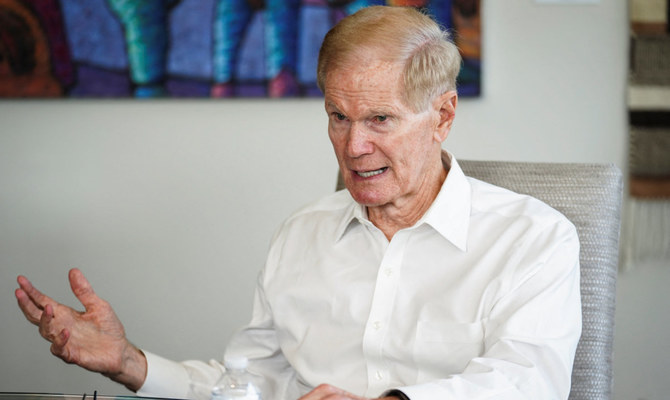
- Solutions to mitigate greenhouse gas emissions that rapidly warm the planet and drive the climate crisis already exist, but require unprecedented changes at a new scale and pace
MEXICO CITY: NASA is hoping that nations will work together more closely in the future on topics such as climate change, including greenhouse gas emissions, the space agency’s head, Bill Nelson, said on Tuesday.
Solutions to mitigate greenhouse gas emissions that rapidly warm the planet and drive the climate crisis already exist, but require unprecedented changes at a new scale and pace.
“This is something that nations can work on together because the information is there,” Nelson said in Mexico City when asked about how to address greenhouse gas emissions. “It’s important that we act on it.”
Satellites have emerged as powerful tools for scientists around the world to study climate change but also, increasingly, pinpoint the origin of greenhouse gas emissions, such as methane leaks, that would otherwise have gone undetected.
Nelson added that satellites were constantly collecting data about climate and NASA was looking to make this data accessible, and educate people on how to use it.
Methane, the main component of natural gas, is the second-largest contributor to global warming after carbon dioxide. Scientists can now pinpoint the origin of large methane leaks using data gathered by satellites.
It is a much more potent driver of global warming in the short term than carbon dioxide because it traps more heat in the atmosphere, ton for ton.
“The types of concerns that we have are global,” said NASA Deputy Administrator Pam Melroy. “It’s very important to recognize that not any one country can solve that problem alone.”
Earlier in the day, Nelson and Melroy, who are both astronauts, met with Mexican President Andres Manuel Lopez Obrador and lawmakers to discuss how the countries can work together.
Canadian police charge 2 former UN employees with conspiracy to sell military equipment in Libya

- Poirier said Mhaouek, a Canadian citizen, was arrested Tuesday morning at his home in the Montreal suburb of Ste-Catherine, Que., and was scheduled to appear in a Montreal court later in the day
MONTREAL: Two former United Nations employees in Montreal have been charged with participating in a conspiracy to sell Chinese-made drones and other military equipment in Libya, Canadian police said Tuesday.
RCMP spokesman Sgt. Charles Poirier said the alleged offenses occurred between 2018 and 2021, when the two men were working at the International Civil Aviation Organization, a UN agency headquartered in Montreal.
Police identified the two men as Fathi Ben Ahmed Mhaouek, 61, and Mahmud Mohamed Elsuwaye Sayeh, 37. Poirer said they violated UN sanctions related to the Libyan civil war. The sanctions have the force of law in Canada by way of federal regulation.
“What we found is that through some shell companies, they attempted to sell this Chinese military equipment to Libya, which is a direct violation of the regulation,” Poirier said, adding that the military equipment included large drones that can carry multiple missiles.
Poirier said the regulation prohibits anyone in Canada from supplying military equipment to any of the factions that were fighting in the Libyan civil war, or helping to finance those groups. The alleged conspiracy, he said, would have benefited one of the two main factions in the conflict, which ended in 2020.
“The second part of this scheme was to export Libyan oil to China,” Poirier said. “So at the time, the oil fields were under the control of Gen. Khalifa Haftar and the plan was to sell millions of drums of crude oil to China without anyone knowing about it.”
Haftar’s self-styled Libyan National Army fought against Libya’s UN-backed government and held much of the country’s east during the civil war; he continues to be a powerful figure in that region.
Poirier said Mhaouek, a Canadian citizen, was arrested Tuesday morning at his home in the Montreal suburb of Ste-Catherine, Que., and was scheduled to appear in a Montreal court later in the day.
Mhaouek’s alleged accomplice remains on the run. An Interpol red notice — an alert sent to police around the world — and a Canada-wide warrant have been issued for Sayeh’s arrest.
Poirier said investigators have no indication that military equipment or crude oil ever reached their alleged final destinations, but he said if they had, the two co-conspirators stood to gain several million dollars in commissions.
“The theory behind the motivation is primarily financial,” he said. However, it would have also benefited China by allowing it to covertly support Haftar’s faction and by giving the country prime access to Libyan oil.
Poirier said the investigation began in 2022 after the RCMP received what he described as “credible intelligence.”
Both men had diplomatic immunity due to their work with the UN Their immunity had to be waived by ICAO before the two men could be charged.
The UN organization, which sets international aviation standards, has been collaborating with the police investigation.
“There’s no indication that ICAO was aware of the conspiracy until they were approached by us,” Poirier said.
Police don’t know where Sayeh, a Libyan national, may be.
“He could be in Libya, but with the level of influence and the networking that these men had working at ICAO, he could be anywhere,” Poirier said.
The UN’s civil aviation agency said in an emailed statement that it is committed to upholding Canadian laws, UN standards and its own ethics code.
“ICAO is fully cooperating with the RCMP investigation of the individuals involved in the complaint, who left the organization a number of years ago,” the agency said. “ICAO strongly condemns any actions of individuals that are inconsistent with the organization’s values.”
Rights concerns, costs undermine Turkiye-EU migrant deal, say auditors
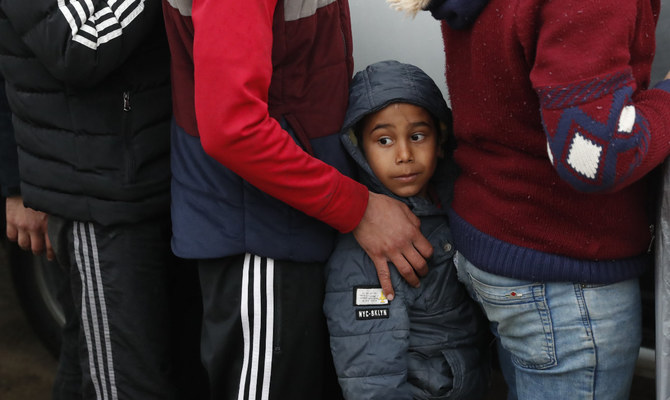
- EU Ombudsman Emily O’Reilly has launched an inquiry into human rights guarantees under the bloc’s new migration deal with Tunisia
BRUSSELS: Turkiye’s poor human rights record and economic factors are undermining the effectiveness of the European Union’s migration deal with Ankara, EU auditors said on Wednesday.
Under the 2016 deal, Ankara agreed to take back migrants who had crossed from its territory to Europe in return for EU aid to help fund more than four million refugees on Turkish soil.
The EU, which faces elections in June for the European Parliament in which illegal migration promises to be a big issue, has sealed agreements similar to the Turkiye scheme with Tunisia, Egypt, Mauritania and others.
In their report, the EU auditors raised concerns about the ability of non-governmental organizations (NGOs) to operate projects, as envisaged under the 6 billion euro ($6.4 billion) deal, given Turkiye’s authoritarian turn since a failed coup in 2016 and its crackdown on dissent.
“The operating situation of NGOs has continuously deteriorated since 2015 and has been exacerbated in the context of the unsuccessful... coup in Turkiye, where NGOs subsequently were targeted through various legislation,” it said.
The European Court of Auditors (ECA) report also cited the difficulty of managing the EU aid in the context of Turkiye’s economic downturn and Ankara’s “backsliding on the rule of law and fundamental rights.”
The report said the European Commission, the EU’s executive, had failed to provide an adequate analysis of costs and that it was unclear what would happen once the aid ended.
“The facility is beneficial for refugees and host communities but we would still like to see improvements in terms of demonstrating impact, ensuring sustainability, and value for money,” said Bettina Jakobsen, who led the ECA report.
Rights groups and some politicians have long accused the EU of neglecting human rights in its drive to curb illegal migration.
“This leads to the EU focusing less on issues that should be of relevance such as the neglect of human rights,” said Florian Trauner, a professor at the Brussels School of Governance.
EU Ombudsman Emily O’Reilly has launched an inquiry into human rights guarantees under the bloc’s new migration deal with Tunisia.




